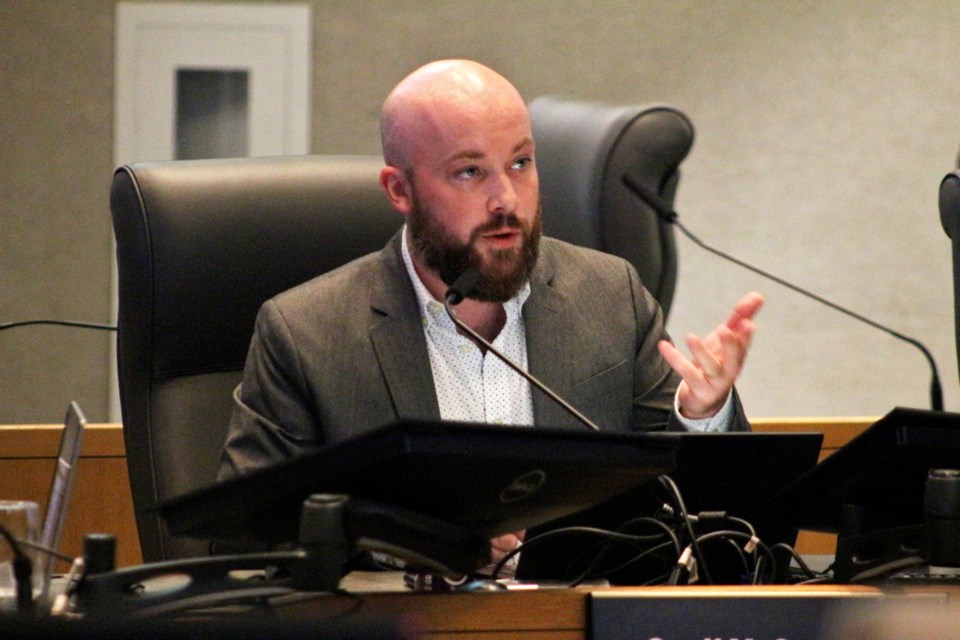A 40-unit transitional housing complex on Lorraine Street with clinical supports to help ease the chronically homeless into permanent community housing will soon become a reality.
Ratified by a subsequent city council meeting, the city’s finance and administration committee meeting of council members issued a decisive 9-2 vote in favour of the project on Tuesday.
“I’m very proud to be part of this council and very proud of the work we are doing,” Ward 9 Coun. Deb McIntosh said of this and the supervised consumption site the city pushed forward despite a lack of operational funding from the provincial government.
The transitional housing complex, she said, will help ease people toward “a healthier life.”
City housing services manager Cindi Briscoe told city council that with 28 plan takers and seven bids submitted, she’s confident they’re receiving good value for their dollar in awarding the $14.4-million design-build tender to Alberta-based Nomodic Modular Structures Inc. and Buttcon Ltd.
Further, with geotechnical work already completed, she said there’s greater certainty in the final price, which is of particular concern during a time in which costs appear on the rise across the board. An upper-level cost estimate projected the transitional housing complex at $10 million early last year.
Approximately $2.4 million of the project’s total cost has been earmarked toward HST and a contingency, “just to be extra safe,” Briscoe said.
The federal government has provided $7.4 million toward the building’s construction, $1 million is coming from the province and the balance is being drawn from city reserves at zero impact to the tax levy.
Tuesday’s 9-2 vote of city council members follows the unanimous support they offered during 2022 budget deliberations.
This time around, Ward 5 Coun. Robert Kirwan and Ward 11 Coun. Bill Leduc voted against the project, citing concerns regarding its location and the fact area residents opposed it.
In October 2021, Kirwan and Leduc held a public meeting at Const. Joseph MacDonald Park, which overlooks the future site of the complex west of Notre Dame Avenue’s intersection with Lasalle Boulevard. Approximately 50 area residents joined them to speak against the project.
“We’re fighting to get this transitional housing downtown, where it belongs, where the services are,” Kirwan told the crowd at the time – a sentiment he reiterated during Tuesday’s meeting.
“Despite having all the clinical supports on site, Public Health is downtown, all of the provincial, federal and municipal services are downtown,” Kirwan told his colleagues on Tuesday.
“It’s not the right location,” he later said, unsuccessfully urging city council members to earmark the building for use as seniors housing instead.
Although Kirwan said the transitional housing complex is “taking 40 units away from the people on the current waiting list,” Ward 4 Coun. Geoff McCausland countered that the complex will allow the city a more effective means of managing its housing continuum.
As the chronically homeless shift out of other accommodations and into the transitional housing complex, others on the affordable housing waitlist will move into units they vacate.
Further, McCausland said, the transitional housing complex is where they should be anyway.
“Without the supports they need, it could be a few weeks, it could be a few months, but a lot of people end up back on the street,” McCausland said of the housing cycle they currently face.
The transitional housing complex offers on-site supports the chronically homeless require to find success, which McCausland said is why it’s important city council is “sticking our neck out” to push forward with this project. This, despite a lack of operational funding from the province for its staff, called the Assertive Community Treatment Team.
Consisting of 12 full-time and four part-time staff, the team will come in at a total cost of $1.74 million per year when fully rolled out, according to a business case council debated during 2021 budget deliberations. The facility’s annual operating cost was estimated at $2.24 million.
Last year, Mayor Brian Bigger issued a public plea for provincial funding, and Ontario’s Big City Mayors joined the fight alongside the Association of Municipalities of Ontario this year.
On Tuesday, Bigger said he met with Mental Health and Addictions Associate Minister Michael Tibollo last week and that the province is “fully aware of the project and we are monitoring it closely moving forward.”
Bigger plans on meeting with provincial officials again during next week’s Association of Municipalities Ontario conference in Ottawa, at which time he’ll provide an update on city council’s direction to move forward with the project.
With council’s approval, the city will proceed with Nomodic Modular Structures Inc. and Buttcon Ltd. in drafting a plan, though community development general manager Steve Jacques clarified that with this being a modular building assembled mainly off-site and put together on Lorraine Street “like Lego,” it’s likely to go up quickly once construction begins.
“Your ability to have a well-designed product that has been done within a controlled environment not exposed to weather… it will be a much more efficient process and reduces a lot of the stick-build issues that most developers and most projects face across this country and across this province.”
Tyler Clarke covers city hall and political affairs for Sudbury.com.
